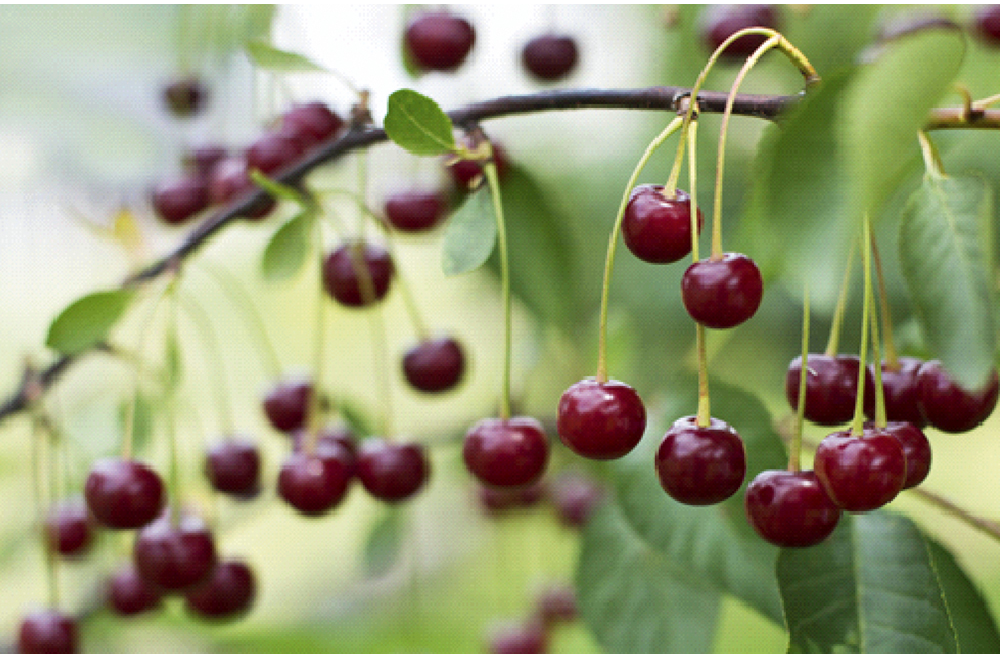Cherry stems: the multiple benefits on health

The cherry, Prunus cerasus (sour cherry, tart cherry, or dwarf cherry), is a species of Prunus from the subgenus Cerasus (cherries). Native to much of Europe and southwest Asia, the Prunus cesarus is closely related to the sweet cherry (Prunus avium), but its fruit is more acidic and offers greater benefits to health.
A “drupe” fruit, meaning it has a central seed with a fleshy exterior, the cherry is a nutritional powerhouse, and has been enjoyed for centuries both for its sweet, delicate and distinct flavour, as well as for its considerable nutritional value.
Cherries are an extremely rich source of minerals (especially potassium), vitamins, protein and fiber, and are chock-full of antioxidants. They also contain polyphenolic flavonoid compounds called anthocyanins, which have powerful, scientifically proven anti-inflammatory properties against COX 1 and 2 pro-inflammatory enzymes (which conventional anti-inflammatory drugs also target), so are great to help reduce pain. Anthocyanins are also of considerable value to brain health and have been shown to improve memory.
While cherry trees begin producing fruit as early as about five years old, it typically takes a good ten to fifteen years for the plant to reach maturity. At that time, a cherry tree can consistently produce more than 100 pounds of fruit per season.
Though most people typically consume the cherry and leave the stem behind, the cherry stem is actually, like its fruit, packed with nutrition and offers distinct nutritional benefits.
Science tells us that cherry stems contain precious volatile oils and potassium salts which are both anti-inflammatory and diuretic, and like cherries, cherry stems also have powerful detoxifying and depurative properties.
Indeed, from a therapeutic perspective, the stem is an extremely valuable part of the cherry. In fact, in alternative and complementary medicine circles, cherry stems have long been recognized as a first-rate natural diuretic when made into a tea or dried and encapsulated. Convenient, effective and safe.
Further, because cherry stems belong to the rose shrub family, they also have potent laxative properties, so are of great value to help treat various forms of constipation. As a depurative, cherry stems can offer solid support in conditions such as cellulitis, cystitis, flu, lithiasis and obesity. In fact, cherry stems are a wonderful addition to begin any weight loss process.
Finally, cherry stems have proven helpful in the treatment of kidney issues, gout and rheumatism, as well as to help strengthen the nerves by exerting an overall calming effect.
THERAPEUTIC INDICATIONS
Diuretic
Cherry stems have been used for centuries in phytotherapy as an effective and safe diuretic solution. These diuretic effects are thought to be primarily due to the naturally occurring bioflavanoids and potassium salts contained in cherry stem.
Indeed, cherry stems have shown to stimulate the elimination of body wastes through urine and the digestive process in general, thereby helping to alleviate water retention and provide relief from bloating, swelling and other classic symptoms of edema, such as heavy legs. Cherry stems are also of considerable value as a supportive to the body’s natural detoxification process, and thus often figure prominently in detoxification programs.
Weight loss
Cherry stems are often recommended to help regulate metabolism, and to support weight loss. Because of their ability to help the body flush out wastes and toxins, cherry stems are believed to help the body eliminate fat and cellulite and to help the skin retain/regain its shape and elasticity throughout the weight loss process. Further, cherry stems help normalize bowel activity and support detoxification processes, both of particular importance during weight loss. Finally, according to recent scientific research published in the American Chemical Society’s Journal of Agricultural and Food Chemistry, the polyphenolic flavonoid compounds, anthocyanins present in cherry stems, help increase insulin production by 50 %, and may thus be helpful to stabilize blood sugar levels and control appetite.
Urinary tract
Because of their powerful diuretic and anti-inflammatory properties, cherry stems are often used, either powdered or in tea form, to help cleanse the kidneys and urinary tract, and to help alleviate symptoms associated with conditions such as UTIs, interstitial cystitis and glomerular diseases in general. Cherry stems can also help to break down and clear stones formed in the urinary tract and kidneys. Of note however, if the stones are too large to pass safely, it is best to discuss the best approach for your particular condition with a knowledgeable healthcare practitioner.
THE POSSIBLE COMBINATIONS
Urinary tract infections and conditions of the kidneys and urinary passages in general are very common, only respiratory infections occur more often in practice. Phytotherapy is particularly effective at quickly alleviating the symptoms and helping support the urinary system. Cherry stems are a classic and scientifically validated diuretic solution. They can be combined very effectively with various other plants such as chamomile, ginger, fennel, mustard, agrimony, elder flower, juniper berries, horsetail, plantain, uva ursi and yarrow root. Grapeseed extract and probiotics are other adjunctives to consider.


Comments
Leave your comment